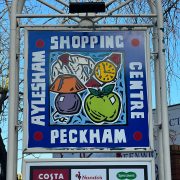
It’s a cold and windy Sunday, but the Peckham Carboot is still a happening place.
The fortnightly sale, which turned five earlier this year, brings in more than 150 sellers by car and by foot, with their merchandise displayed on sheets, tables and clothing rails.
Every other Sunday, from 10am until 2pm, the grounds of Harris Academy, a secondary school just off Rye Lane, turn into the Peckham Carboot. The traders set up shop, selling clothes, homeware, jewellery, cameras and much more. Food and drink is available near the entrance.
Jasmine Ward, an administrator for the sales, says that when it began in 2019, the car boot’s team consisted of just three people: co-founders Steven Lopes and Erin Murphy, and Erin’s sister Harriet. “It was a kind of labour of love between the three, and then it just grew,” says Ward.
Grow it did. In real terms, the sale can be called a success. Starting as a monthly event with an average of just 40 traders, the car boot now features up to 160 at a time every two weeks. It’s run by a team of eight.

The car boot has a staggered fee system for guests, which helps to moderate the foot traffic (and makes a nice bit of dosh). Those entering when the sale opens pay £7 to get in, which goes down to a fiver from 10:30am to 11am, after which it stays fixed at £1. This system works well, says Ward. “The people who want to get there earlier are happy to pay a bit more… [and] it allows our first hour to be a bit quieter and helps people to be able to set up.”
There are a range of fees for sellers. Vans pay £30 to set up shop; cars £18 and walk-ins £13. Leia Clarkson, who did a walk-in with her partner Dan Clark for the first time in November, says she finds the fees “a bit extravagant.”

Leia says she’s been selling on second hand platforms such as Vinted and Depop since she was at university and decided to try out the car boot after her “friends had been raving about it.” Jackets tend to be the hottest commodity, she says, followed by trainers and anything that’s been in trend, from brands like C.P. Company and Palace.



Adrian and his wife are less specific in what they sell. The couple drive in to the sale, hanging some of their stock on the car doors. Asked what inspired him to start selling, Adrian says: “Cash, man! You see the money to be made, and it takes hold.” His advice to sellers? “Try and be as eclectic as you can be but also know your strengths… [and] know your market.”

The car boot also serves as a community-building event. Ward says: “We also want it to be for people to come and have something to do on a Sunday. Peckham is a real hub in southeast London… [and] it’s a way for people to come together, whether they live in the area or not.”
Asked about the appeal of a car boot over she says they’re “very different to how capitalism expects us to experience shopping. It’s fun seeing what you can get for a bargain and seeing what you can get that’s one of a kind.”
However, car boots aren’t the only type of sale run by the team. They also lay on occasional flea markets at other locations, which Ward says are “more curated designer vintage items for people who have businesses and reselling is their way of making money.” She mentions plans to expand car boot sales next year but can’t say too much about it.
During the COVID-19 lockdowns, the car boot couldn’t run at the Harris Academy site, so it adapted and was run through Instagram instead. Their page featured items from different sellers and customers could buy via direct message. Ward says this helped the car boot gain a much larger social media presence. She says: “It was a good way to keep up momentum and interest, and definitely helped us to grow by doing this online format during the pandemic.”
After a winter break, the car boot returns mid-February.




